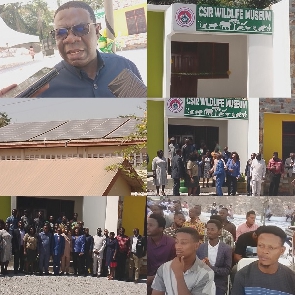 The commissioning of the Wildlife Museum and solar panel system
The commissioning of the Wildlife Museum and solar panel system
A new wildlife museum and solar power system have been commissioned by the management and staff of the CSIR- Forestry Research Institute of Ghana (CSIR- FORIG).
The move which aims to help it deliver efficiently on its multi-disciplinary expertise mandate, is also seeking to expand the facilities in that regard to help address the emerging resources/facilities challenges.
It is worth noting that the CSIR-FORIG has a role in undertaking demand-driven research, build capacity, and promoting the application of technologies for sustainable management of forest resources for the benefit of society.
Speaking during the commissioning of the two projects, Daniel A. Ofori who is the director building of the CSIR- FORIG, said there was much hope that these facilities were going to help improve their delivery to support Ghana's growth and development.
Particularly touching on the Wildlife Museum, Daniel Ofori said that the decline in development biodiversity is a well-known global issue and that effective management of biodiversity and the environment was crucial for its preservation.
He said it was very unfortunate that forests in Ghana have deteriorated into quasi-open access areas with widespread encroachment and illegal forest activities such as logging, hunting, wildfires, and mining, among others.
According to him, this has in turn caused habitat destruction, species migration, biodiversity loss, and even the extinction of many species.
The introduction of the Wildlife Museum, he said, will play a crucial role in the preservation and documentation of biodiversity, encompassing living organisms, their habitats, and their genetic makeup.
He added that the introduction of the wildlife museum will be a repository of high-quality knowledge and information on the country's biodiversity to ensure informed decision-making in environmental planning and conservation management.
Further speaking on the institution's decision to fix a 100 KVA solar power system, the CSIR- FORIG director said the institution was motivated to explore an alternative power supply following a huge electricity bill (Gh¢480,000) it received a few years ago from the Electricity Company of Ghana.
He said being an institution that places a premium on environmental issues, solar energy was selected due to its renewable energy source, adding that it can never get used up.
"It possesses cleanliness and creates no carbon emissions or other heat-trapping greenhouse gases. It avoids environmental damage associated with mining drilling for fossil fuels.", he added.
Speaking on its economic benefits, he said, the grid-tied solar power system will help reduce electricity bills.
Robert Kingsford Adaboh, CSIR Council Chairman who describes the move as a pioneering step to resolving most of the biodiversity and environmental degradation challenge, further observed that the establishment of the new museum was not only going to the rich wildlife of Ghana but also serves as a catalyst for research and education, fostering a deeper understanding of the intricate ecosystems that support life on our planet.
He said, the CSIR- wildlife museum built by the CSIR-FORIG will serve as a knowledge hub for such information. He therefore expressed the belief that the scientific community, students, and all other relevant stakeholders will find the facility useful by being informed about nature.
He urged management to hire or provide staff training specifically to ensure the museum is managed at the highest standard.